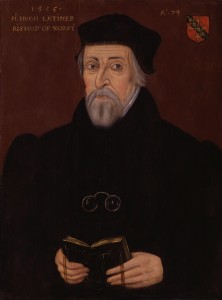Hugh Latimer was an English Reformer who lived from 1485 to 1555. Martin Luther posted his 95 Thesis in 1517 and John Calvin wrote his Institutes of the Christian Religion in 1555.
Latimer was originally a Roman Catholic priest who was educated at Cambridge. Being a staunch Papist, Latimer initially debated the “new” doctrines of Justification by Faith (in particular the teachings of Philipp Melanchthon) until he was confronted by Thomas Bilney, a new convert who sought him out and shared his testimony with the priest. Latimer accepted the Reformed Doctrines that day and never looked back.
Latimer later joined a group of reformers including Bilney and Robert Barnes who met regularly at the White Horse Tavern. Latimer became a faithful expositor of the Holy Scriptures. With evangelistic fervor he taught:
“Catch thou hold of our Saviour, believe in Him, be assured in thy heart that He with His suffering took away thy sins.”
Mary Tutor was on the throne of England from 1553-1558. She was the eldest daughter of Henry VIII and only surviving child of Catherine of Aragon. As the fourth crowned monarch of the Tudor dynasty, she returned England to Roman Catholicism after succeeding her short-lived Protestant half brother, Edward VI. “Bloody Mary” (as she became known), was bringing a reign of terror on all in England who accepted the Protestant faith. In all she had nearly she had almost 300 religious dissenters burned at the stake in the Marian Persecutions.
Latimer and Nicholas Ridley were burned at the stake at Oxford in 1555, with Thomas Cranmer watching. He too would give his life the following year. As Latimer was dying, he encouraged his friend by yelling from the flames:
“Be of good comfort, Master Ridley, and play the man! We shall this day light such a candle by God’s grace in England as I trust shall never be put out!”
England was never again under the Pope. Now known as the Oxford Martyrs — these men are commemorated in Oxford by the Victorian Martyrs’ Memorial which is located near the actual execution site which is marked by a cross in Broad Street, (then the ditch outside the city’s North Gate). The Latimer room in Clare College, Cambridge is named after him.
Hugh Latimer, a late-comer to the truth, was faithful until death. My questions to you is, “Are you willing to play the man and offer your candle as a light for others?”


I just recently came upon this site and cant get enough of it! Thank you much for the History and the Hymnology as well.
One never knows how God will use you – these men live forever as giants of the faith. Latimer’s sermon Canst Thou heal me has given me new insight into prayer – it’s simple eloquence lost today in the midst of all the clamor of the modern church – seeking the ancient path and narrow way lost in evangelical thought –